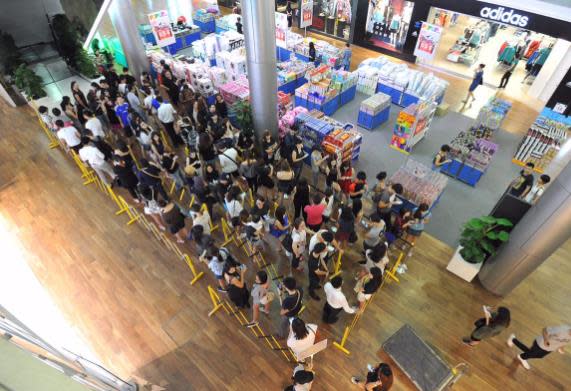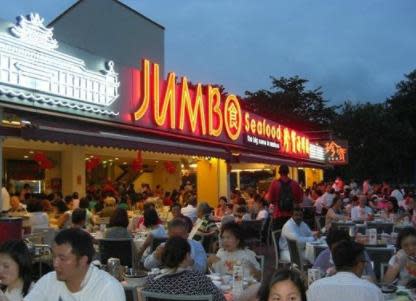SI Research: How To Invest In The Food and Beverage Sector?
“Worthless people live only to eat and drink; people of worth eat and drink only to live.” – Socrates
What was the Greek philosopher thinking? During his time – he lived from 469 BC to 399BC – people who loved to eat were probably viewed very differently from the modern men and women who love to “eat, drink and make merry”.
Was Socrates expecting people to work in the fields, eat bare minimal and sleep at 8pm?
If he had lived till today, he would be hopping mad; he would rise from the grave sensing that something was amiss!
If he had been an analyst today, he would be bashing all Food and Beverage (F&B) stocks to the extent that local companies such as BreadTalk, Jumbo, Old Chang Kee and Tung Lok would be smashed to bits with perennial downgrades.
Most Singaporeans Live To Eat
To Socrates: We live in different era so bear with us as we take investors through the world of F&B – an industry that Singaporeans cannot live without.
Some still eat just to live while just as many, if not even more, live to eat. It really depends on ones’ income level: self-proclaimed foodies who have deep pockets will swear by Les Amis Group, eat nothing but Wolfgang Puck’s steak and settle for nothing less than Jamie Oliver’s pasta.
Others who swear that Singapore’s food culture is the only form fit for human consumption swear by hawker centres and coffeeshops – their usual hangouts.
However, the bottom line is that we, Singaporeans, simply love eating. Who would queue hours just to get a taste of a one-star Michelin outlet selling chicken and another one selling traditional noodles?
Singaporeans Queueing For Cheese Tarts
Eat More To Invest Smartly
Billionaire investors such as Warren Buffett will tell you to invest in companies that you are familiar with. If you do not know an industry, do not invest in a company from that particular industry unless you have a hot tip!
[Editor’s comment: Trust us when we say that listening to hot tips are the fastest way to lose your pants!]
Since we love to eat, what better industry than the F&B sector to invest in? Why do we say that?
First Scenario
There is a particular restaurant that sells seafood. It has a couple of outlets but each time you pass by the outlets, there are only a few occupied tables. Tell-tale sign, right?
Then you learn that this restaurant chain has certain outlets running a promotion whereby you can download coupons after submitting your email address via Facebook, and these coupons entitle you to a free dish provided you spend a certain amount of money.
You are tempted, you visit this outlet and you discover that the food tastes far from what it used to taste, service is horrible and there is a lack of patrons despite the ongoing promotion. Angered by the substandard food and service provided, you try to visit its Facebook page to give a bad review only to realize that there are many customers like you who feel the same.
If such a restaurant chain was listed on the stock exchange, will you invest in its shares?
Second Scenario
You tried the hottest restaurant in town and you have become a regular patron. But each time you tried to make a reservation, you get rejected because the bookings were full even till next week.
Facebook pages continue to give rave reviews and you realize that the restaurant is still getting patronized. Such restaurants never need to do promotion, give discounts or even advertise either in the mainstream media or digital media. Why? Because good things sell by itself, sell by word of mouth and profit margins will be high without the restaurant paying for marketing campaigns.
If such a restaurant was listed on the stock exchange, will you invest in its shares? It seems like a no-brainer which company you would invest in when comparing the two different scenarios or companies.
By being a “hands-on analyst”, one will be better able to invest in companies as there can be no investor than one who makes company visits, try out its products and see for oneself at first hand if the business is viable.
Rental & Labour – Double Whammy
We spoke to a very successful owner of a chain of restaurants in Singapore who advised us that there are two main factors that you need to control in order to run a successful food business in Singapore – rental and labour.
We all know that most mid-to-high end restaurants are located in shopping malls and most of these malls are in turn listed on the stock exchanges in the form of Real Estate Investment Trusts (REITs). And then we also know that investors are attracted to REITs because of the defensive nature of such as investment tool whereby REIT prices have been trending up or, at the very least, stable and not as volatile as other stocks. More importantly, REITs must maintain a certain level of return so that they are able to pay the dividend that investors yearn for.
In order to satisfy investors’ insatiable demand for more yield, REITs need to keep increasing rental of their mall units or find more innovative ways to increase the yield. This is very toxic for F&B companies because rental costs make up a sizeable chunk of its overall operating cost.
And so is labour cost. When you eat at restaurants, you will not expect to queue and serve yourself like you are in some fast food chain. The cost of waiters, waitresses, the cooks, cleaning stuff all eat into profit and being clipped by rules and regulations (and foreign workers’ levy!) imposed by the government.
These poor business owners suffer from migraine just handling cost issues alone! This is also the reason why more and more youngsters prefer to operate from hawker centres and coffeeshops instead of at shopping malls. And who is to say that operating from coffeeshops has no future? Ask Kimly, which we are featuring in this issue of Shares Investment.
In addition, we are also featuring Thai Beverage Public Company and Jumbo Group – both engaged in the F&B business – albeit at different segments of the value chain. While one is a beverage producer and the other is a famous restaurant chain based in Singapore, we want to encourage investors to pick a stock that you are knowledgeable about! If you travel frequently to Thailand or are familiar with the Thai operating environment, by all means invest in Thai Beverage if you think that it is viable to do so. Otherwise, please pick something that you can see and feel, and are more comfortable with, which means invest in something easy to understand and analyse.
Full House At Jumbo Restaurant (East Coast Park)
ThaiBev’s Top-Selling Beer

 Yahoo Finance
Yahoo Finance 



